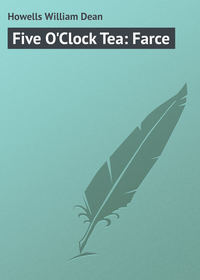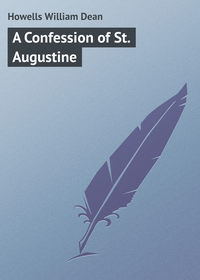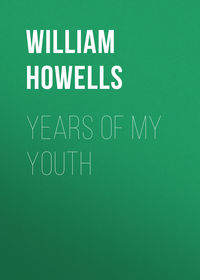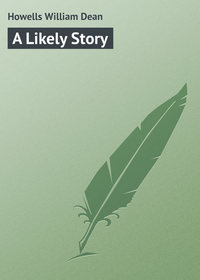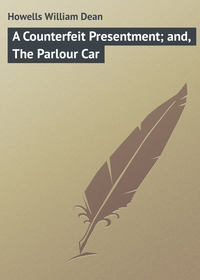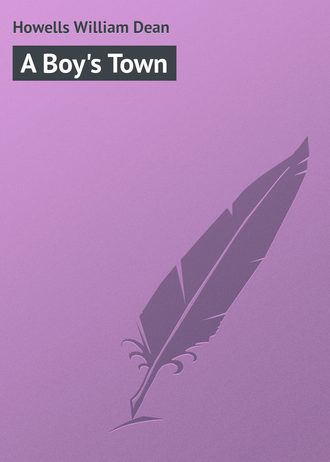 полная версия
полная версияA Boy's Town
It was already the time of the Mexican war, when that part of the West at least was crazed with a dream of the conquest which was to carry slavery wherever the flag of freedom went. The volunteers were mustered in at the Boy's Town; and the boys, who understood that they were real soldiers, and were going to a war where they might get killed, suffered a disappointment from the plain blue of their uniform and the simplicity of their caps, which had not the sign of a feather in them. It was a consolation to know that they were going to fight the Mexicans; not so much consolation as if it had been the Bridish, though still something. The boys were proud of them, and they did not realize that most of these poor fellows were just country-jakes. Somehow they effaced even the Butler Guards in their fancy, though the Guards paraded with them, in all their splendor, as escort.
But this civic satisfaction was alloyed for my boy by the consciousness that both his father and his grandfather abhorred the war that the volunteers were going to. His grandfather, as an Abolitionist, and his father, as a Henry Clay Whig, had both been opposed to the annexation of Texas (which the boy heard talked of without knowing in the least what annexation meant), and they were both of the mind that the war growing out of it was wanton and wicked. His father wrote against it in every number of his paper, and made himself hated among its friends, who were the large majority in the Boy's Town. My boy could not help feeling that his father was little better than a Mexican, and whilst his filial love was hurt by things that he heard to his disadvantage, he was not sure that he was not rightly hated. It gave him a trouble of mind that was not wholly appeased by some pieces of poetry that he used to hear his father reading and quoting at that time, with huge enjoyment. The pieces were called "The Biglow Papers," and his father read them out of a Boston newspaper, and thought them the wisest and wittiest things that ever were. The boy always remembered how he recited the lines —
"Ez fur war, I call it murder —There ye hev it plain and flat;'N I don't want to go no furderThen my Testament fur that.God hez said so plump and fairly:It's as long as it is broad;And ye'll hev to git up airly,Ef ye want to take in God."He thought this fine, too, but still, it seemed to him, in the narrow little world where a child dwells, that his father and his grandfather were about the only people there were who did not wish the Mexicans whipped, and he felt secretly guilty for them before the other boys.
It was all the harder to bear because, up to this time, there had been no shadow of difference about politics between him and the boys he went with. They were Whig boys, and nearly all the fellows in the Boy's Town seemed to be Whigs. There must have been some Locofoco boys, of course, for my boy and his friends used to advance, on their side, the position that
"DemocratsEat dead rats!"The counter-argument that
"WhigsEat dead pigs!"had no force in a pork-raising country like that; but it was urged, and there must have been Democratic boys to urge it. Still, they must have been few in number, or else my boy did not know them. At any rate, they had no club, and the Whig boys always had a club. They had a Henry Clay Club in 1844, and they had Buckeye Clubs whenever there was an election for governor, and they had clubs at every exciting town or county or district election. The business of a Whig club among the boys was to raise ash flag-poles, in honor of Henry Clay's home at Ashland, and to learn the Whig songs and go about singing them. You had to have a wagon, too, and some of the club pulled while the others rode; it could be such a wagon as you went walnutting with; and you had to wear strands of buckeyes round your neck. Then you were a real Whig boy, and you had a right to throw fire-balls and roll tar-barrels for the bonfires on election nights.
I do not know why there should have been so many empty tar-barrels in the Boy's Town, or what they used so much tar for; but there were barrels enough to celebrate all the Whig victories that the boys ever heard of, and more, too; the boys did not always wait for the victories, but celebrated every election with bonfires, in the faith that it would turn out right.
Maybe the boys nowadays do not throw fire-balls, or know about them. They were made of cotton rags wound tight and sewed, and then soaked in turpentine. When a ball was lighted a boy caught it quickly up, and threw it, and it made a splendid streaming blaze through the air, and a thrilling whir as it flew. A boy had to be very nimble not to get burned, and a great many boys dropped the ball for every boy that threw it. I am not ready to say why these fire-balls did not set the Boy's Town on fire, and burn it down, but I know they never did. There was no law against them, and the boys were never disturbed in throwing them, any more than they were in building bonfires; and this shows, as much as anything, what a glorious town that was for boys. The way they used to build their bonfires was to set one tar-barrel on top of another, as high as the biggest boy could reach, and then drop a match into them; in a moment a dusky, smoky flame would burst from the top, and fly there like a crimson flag, while all the boys leaped and danced round it, and hurrahed for the Whig candidates. Sometimes they would tumble the blazing barrels over, and roll them up and down the street.
The reason why they wore buckeyes was that the buckeye was the emblem of Ohio, and Ohio, they knew, was a Whig state. I doubt if they knew that the local elections always went heavily against the Whigs; but perhaps they would not have cared. What they felt was a high public spirit, which had to express itself in some way. One night, out of pure zeal for the common good, they wished to mob the negro quarter of the town, because the "Dumb Negro" (a deaf-mute of color who was a very prominent personage in their eyes) was said to have hit a white boy. I believe the mob never came to anything. I only know that my boy ran a long way with the other fellows, and, when he gave out, had to come home alone through the dark, and was so afraid of ghosts that he would have been glad of the company of the lowest-down black boy in town.
There were always fights on election-day between well-known Whig and Democratic champions, which the boys somehow felt were as entirely for their entertainment as the circuses. My boy never had the heart to look on, but he shared the excitement of the affair, and rejoiced in the triumph of Whig principles in these contests as cordially as the hardiest witness. The fighting must have come from the drinking, which began as soon as the polls were opened, and went on all day and night with a devotion to principle which is now rarely seen. In fact, the politics of the Boy's Town seem to have been transacted with an eye single to the diversion of the boys; or if not that quite, they were marked by traits of a primitive civilization among the men. The traditions of a rude hospitality in the pioneer times still lingered, and once there was a Whig barbecue, which had all the profusion of a civic feast in mediæval Italy. Every Whig family contributed loaves of bread and boiled hams; the Whig farmers brought in barrels of cider and wagon-loads of apples; there were heaps of pies and cakes; sheep were roasted whole, and young roast pigs, with oranges in their mouths, stood in the act of chasing one another over the long tables which were spread in one of the largest pork-houses, where every comer was freely welcome. I suppose boys, though, were not allowed at the dinner; all that my boy saw of the barbecue were the heaps of loaves and hams left over, that piled the floor in one of the rooms to the ceiling.
He remained an ardent Whig till his eleventh year, when his father left the party because the Whigs had nominated, as their candidate for president, General Taylor, who had won his distinction in the Mexican war, and was believed to be a friend of slavery, though afterwards he turned out otherwise. My boy then joined a Free-Soil club, and sang songs in support of Van Buren and Adams. His faith in the purity of the Whigs had been much shaken by their behavior in trying to make capital out of a war they condemned; and he had been bitterly disappointed by their preferring Taylor to Tom Corwin, the favorite of the anti-slavery Whigs. The "Biglow Papers" and their humor might not have moved him from his life-long allegiance, but the eloquence of Corwin's famous speech against the Mexican war had grounded him in principles which he could not afterwards forsake. He had spoken passages of that speech at school; he had warned our invading hosts of the vengeance that has waited upon the lust of conquest in all times, and has driven the conquerors back with trailing battle-flags. "So shall it be with yours!" he had declaimed. "You may carry them to the loftiest peaks of the Cordilleras; they may float in insolent triumph in the halls of Montezuma; but the weakest hand in Mexico, uplifted in prayer, can call down a power against you before which the iron hearts of your warriors shall be turned into ashes!" It must have been a terrible wrench for him to part from the Whig boys in politics, and the wrench must have been a sudden one at last; he was ashamed of his father for opposing the war, and then, all at once, he was proud of him for it, and was roaring out songs against Taylor as the hero of that war, and praising Little Van, whom he had hitherto despised as the "Fox of Kinderhook."
The fox was the emblem (totem) of the Democrats in the campaigns of 1840 and 1844; and in their processions they always had a fox chained to the hickory flag-poles which they carried round on their wagons, together with a cock, reconciled probably in a common terror. The Whigs always had the best processions; and one of the most signal days of my boy's life was the day he spent in following round a Henry Clay procession, where the different trades and industries were represented in the wagons. There were coopers, hatters, shoemakers, blacksmiths, bakers, tinners, and others, all hard at work; and from time to time they threw out to the crowd something they had made. My boy caught a tin cup, and if it had been of solid silver he could not have felt it a greater prize. He ran home to show it and leave it in safe-keeping, and then hurried back, so as to walk with the other boys abreast of a great platform on wheels, where an old woman sat spinning inside of a log-cabin, and a pioneer in a hunting-shirt stood at the door, with his long rifle in his hand. In the window sat a raccoon, which was the Whig emblem, and which, on all their banners, was painted with the legend, "That same old Coon!" to show that they had not changed at all since the great days when they elected the pioneer, General Harrison, president of the United States. Another proof of the fact was the barrel of hard-cider which lay under the cabin window.
XII.
PETS
As there are no longer any Whig boys in the world, the coon can no longer be kept anywhere as a political emblem, I dare say. Even in my boy's time the boys kept coons just for the pleasure of it, and without meaning to elect Whig governors and presidents with them. I do not know how they got them – they traded for them, perhaps, with fellows in the country that had caught them, or perhaps their fathers bought them in market; some people thought they were very good to eat, and, like poultry and other things for the table, they may have been brought alive to market. But, anyhow, when a boy had a coon, he had to have a store-box turned open side down to keep it in, behind the house; and he had to have a little door in the box to pull the coon out through when he wanted to show it to other boys, or to look at it himself, which he did forty or fifty times a day, when he first got it. He had to have a small collar for the coon, and a little chain, because the coon would gnaw through a string in a minute. The coon himself never seemed to take much interest in keeping a coon, or to see much fun or sense in it. He liked to stay inside his box, where he had a bed of hay, and whenever the boy pulled him out, he did his best to bite the boy. He had no tricks; his temper was bad; and there was nothing about him except the rings round his tail and his political principles that anybody could care for. He never did anything but bite, and try to get away, or else run back into his box, which smelt, pretty soon, like an animal-show; he would not even let a fellow see him eat.
My boy's brother had a coon, which he kept a good while, at a time when there was no election, for the mere satisfaction of keeping a coon. During his captivity the coon bit his keeper repeatedly through the thumb, and upon the whole seemed to prefer him to any other food; I do not really know what coons eat in a wild state, but this captive coon tasted the blood of nearly that whole family of children. Besides biting and getting away, he never did the slightest thing worth remembering; as there was no election, he did not even take part in a Whig procession. He got away two or three times. The first thing his owner would know when he pulled the chain out was that there was no coon at the end of it, and then he would have to poke round the inside of the box pretty carefully with a stick, so as not to get bitten; after that he would have to see which tree the coon had gone up. It was usually the tall locust-tree in front of the house, and in about half a second all the boys in town would be there, telling the owner of the coon how to get him. Of course the only way was to climb for the coon, which would be out at the point of a high and slender limb, and would bite you awfully, even if the limb did not break under you, while the boys kept whooping and yelling and holloing out what to do, and Tip the dog just howled with excitement. I do not know how that coon was ever caught, but I know that the last time he got away he was not found during the day, but after nightfall he was discovered by moonlight in the locust-tree. His owner climbed for him, but the coon kept shifting about, and getting higher and higher, and at last he had to be left till morning. In the morning he was not there, nor anywhere.
It had been expected, perhaps, that Tip would watch him, and grab him if he came down, and Tip would have done it probably if he had kept awake. He was a dog of the greatest courage, and he was especially fond of hunting. He had been bitten oftener by that coon than anybody but the coon's owner, but he did not care for biting. He was always getting bitten by rats, but he was the greatest dog for rats that there almost ever was. The boys hunted rats with him at night, when they came out of the stables that backed down to the Hydraulic, for water; and a dog who liked above all things to lie asleep on the back-step, by day, and would no more think of chasing a pig out of the garden than he would think of sitting up all night with a coon, would get frantic about rats, and would perfectly wear himself out hunting them on land and in the water, and keep on after the boys themselves were tired. He was so fond of hunting, anyway, that the sight of a gun would drive him about crazy; he would lick the barrel all over, and wag his tail so hard that it would lift his hind-legs off the ground.
I do not know how he came into that family, but I believe he was given to it full grown by somebody. It was some time after my boy failed to buy what he called a Confoundland dog, from a colored boy who had it for sale, a pretty puppy with white and black spots which he had quite set his heart on; but Tip more than consoled him. Tip was of no particular breed, and he had no personal beauty; he was of the color of a mouse of an elephant, and his tail was without the smallest grace; it was smooth and round, but it was so strong that he could pull a boy all over the town by it, and usually did; and he had the best, and kindest, and truest ugly old face in the world. He loved the whole human race, and as a watch-dog he was a failure through his trustful nature; he would no more have bitten a person than he would have bitten a pig; but where other dogs were concerned, he was a lion. He might be lying fast asleep in the back-yard, and he usually was, but if a dog passed the front of the house under a wagon, he would be up and after that dog before you knew what you were about. He seemed to want to fight country dogs the worst, but any strange dog would do. A good half the time he would come off best; but, however he came off, he returned to the back-yard with his tongue hanging out, and wagging his tail in good-humor with all the world. Nothing could stop him, however, where strange dogs were concerned. He was a Whig dog, of course, as any one could tell by his name, which was Tippecanoe in full, and was given him because it was the nickname of General Harrison, the great Whig who won the battle of Tippecanoe. The boys' Henry Clay Club used him to pull the little wagon that they went about in singing Whig songs, and he would pull five or six boys, guided simply by a stick which he held in his mouth, and which a boy held on either side of him. But if he caught sight of a dog that he did not know, he would drop that stick and start for that dog as far off as he could see him, spilling the Henry Clay Club out of the wagon piecemeal as he went, and never stopping till he mixed up the strange dog in a fight where it would have been hard to tell which was either champion and which was the club wagon. When the fight was over Tip would come smilingly back to the fragments of the Henry Clay Club, with pieces of the vehicle sticking about him, and profess himself, in a dog's way, ready to go on with the concert.
Any crowd of boys could get Tip to go off with them, in swimming, or hunting, or simply running races. He was known through the whole town, and beloved for his many endearing qualities of heart. As to his mind, it was perhaps not much to brag of, and he certainly had some defects of character. He was incurably lazy, and his laziness grew upon him as he grew older, till hardly anything but the sight of a gun or a bone would move him. He lost his interest in politics, and, though there is no reason to suppose that he ever became indifferent to his principles, it is certain that he no longer showed his early ardor. He joined the Free-Soil movement in 1848, and supported Van Buren and Adams, but without the zeal he had shown for Henry Clay. Once a year as long as the family lived in the Boy's Town, the children were anxious about Tip when the dog-law was put in force, and the constables went round shooting all the dogs that were found running at large without muzzles. At this time, when Tip was in danger of going mad and biting people, he showed a most unseasonable activity, and could hardly be kept in bounds. A dog whose sole delight at other moments was to bask in the summer sun, or dream by the winter fire, would now rouse himself to an interest in everything that was going on in the dangerous world, and make forays into it at all unguarded points. The only thing to do was to muzzle him, and this was done by my boy's brother with a piece of heavy twine, in such a manner as to interfere with Tip's happiness as little as possible. It was a muzzle that need not be removed for either eating, drinking, or fighting; but it satisfied the law, and Tip always came safely through the dog-days, perhaps by favor or affection with the officers who were so inexorable with some dogs.
My boy long remembered with horror and remorse his part in giving up to justice an unconscious offender, and seeing him pay for his transgression with his life. The boy was playing before his door, when a constable came by with his rifle on his shoulder, and asked him if he had seen any unmuzzled dogs about; and partly from pride at being addressed by a constable, partly from a nervous fear of refusing to answer, and partly from a childish curiosity to see what would happen, he said, "Yes; one over there by the pork-house." The constable whistled, and the poor little animal, which had got lost from the farmer it had followed to town, came running into sight round the corner of the pork-house, and sat up on its haunches to look about. It was a small red dog, the size of a fox, and the boy always saw it afterwards as it sat there in the gray afternoon, and fascinated him with its deadly peril. The constable swung his rifle quickly to his shoulder; the sharp, whiplike report came, and the dog dropped over, and its heart's blood flowed upon the ground and lay there in a pool. The boy ran into the house, with that picture forever printed in his memory. For him it was as if he had seen a fellow-being slain, and had helped to bring him to his death.
Whilst Tip was still in his prime the family of children was further enriched by the possession of a goat; but this did not belong to the whole family, or it was, at least nominally, the property of that eldest brother they all looked up to. I do not know how they came by the goat, any more than I know how they came by Tip; I only know that there came a time when it was already in the family, and that before it was got rid of it was a presence there was no mistaking. Nobody who has not kept a goat can have any notion of how many different kinds of mischief a goat can get into, without seeming to try, either, but merely by following the impulses of its own goatishness. This one was a nanny-goat, and it answered to the name of Nanny with an intelligence that was otherwise wholly employed in making trouble. It went up and down stairs, from cellar to garret, and in and out of all the rooms, like anybody, with a faint, cynical indifference in the glance of its cold gray eyes that gave no hint of its purposes or performances. In the chambers it chewed the sheets and pillow-cases on the beds, and in the dining-room, if it found nothing else, it would do its best to eat the table-cloth. Washing-day was a perfect feast for it, for then it would banquet on the shirt-sleeves and stockings that dangled from the clothes-line, and simply glut itself with the family linen and cotton. In default of these dainties, Nanny would gladly eat a chip-hat; she was not proud; she would eat a split-basket, if there was nothing else at hand. Once she got up on the kitchen-table, and had a perfect orgy with a lot of fresh-baked pumpkin-pies she found there; she cleaned all the pumpkin so neatly out of the pastry shells that, if there had been any more pumpkin left, they could have been filled up again, and nobody could have told the difference. The grandmother, who was visiting in the house at the time, declared to the mother that it would serve the father and the boys just right if she did fill these very shells up and give them to the father and the boys to eat. But I believe this was not done, and it was only suggested in a moment of awful exasperation, and because it was the father who was to blame for letting the boys keep the goat. The mother was always saying that the goat should not stay in the house another day, but she had not the heart to insist on its banishment, the children were so fond of it. I do not know why they were fond of it, for it never showed them the least affection, but was always taking the most unfair advantages of them, and it would butt them over whenever it got the chance. It would try to butt them into the well when they leaned down to pull up the bucket from the curb; and if it came out of the house, and saw a boy cracking nuts at the low flat stone the children had in the back-yard to crack nuts on, it would pretend that the boy was making motions to insult it, and before he knew what he was about it would fly at him and send him spinning head over heels. It was not of the least use in the world, and could not be, but the children were allowed to keep it till, one fatal day, when the mother had a number of other ladies to tea, as the fashion used to be in small towns, when they sat down to a comfortable gossip over dainty dishes of stewed chicken, hot biscuit, peach-preserves, sweet tomato-pickles, and pound-cake. That day they all laid off their bonnets on the hall-table, and the goat, after demurely waiting and watching with its faded eyes, which saw everything and seemed to see nothing, discerned a golden opportunity, and began to make such a supper of bonnet-ribbons as perhaps never fell to a goat's lot in life before. It was detected in its stolen joys just as it had chewed the ribbon of a best bonnet up to the bonnet, and was chased into the back-yard; but, as it had swallowed the ribbon without being able to swallow the bonnet, it carried that with it. The boy who specially owned the goat ran it down in a frenzy of horror and apprehension, and managed to unravel the ribbon from its throat, and get back the bonnet. Then he took the bonnet in and laid it carefully down on the table again, and decided that it would be best not to say anything about the affair. But such a thing as that could not be kept. The goat was known at once to have done the mischief; and this time it was really sent away. All the children mourned it, and the boy who owned it the most used to go to the house of the people who took it, and who had a high board fence round their yard, and try to catch sight of it through the cracks. When he called "Nanny" it answered him instantly with a plaintive "Baa!" and then, after a vain interchange of lamentations, he had to come away, and console himself as he could with the pets that were left him.


